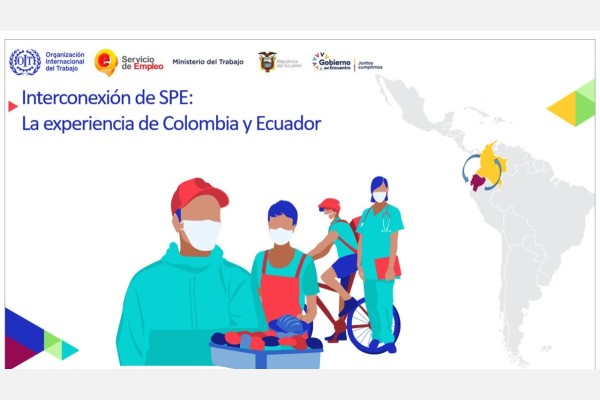Repository of Practices

Interconnection of the Public Employment Services of the Quito Process Countries
Secondary GCM Objectives
Dates
Type of practice
Summary
ILO offers technical assistance to the Quito Process, a regional migration consultation mechanism for countries that host Venezuelan refugees and migrants. Participating countries include Argentina, Brazil, Chile, Colombia, Costa Rica, Ecuador, Mexico, Panama, Paraguay, Peru, and Uruguay. ILO contributes to the Quito Process by providing technical assistance in several thematic areas, first and foremost socioeconomic integration. One of the areas which ILO supports the Quito Process is the strengthening of capacities and creation of a network of Public Employment Services (PES). Recommendation No. 8 of the Joint Statement of the VII International Technical Meeting on Human Mobility of Venezuelan Nationals (the ‘Lima Declaration’ of the Quito Process) seeks to promote the integration of the PES in the region to create a common route for fair, orderly, safe, and transparent regional labour mobility. ILO provided technical assistance to a pilot experience between the Colombian and Ecuadorian PES, which aims at sharing vacancies, job seekers’ profiles, and provide workers with useful information on labour rights in each participating country.
The key beneficiaries are both native and migrant workers, as anyone can benefit from the project regardless of nationality. The activities were made possible thanks to resources provided by Immigration, Refugees and Citizenship Canada (IRCC), as well as ILO’s regular budget. IOM also contributed by funding two technical consultancies.
Organizations
Main Implementing Organization(s)
Detailed Information
Partner/Donor Organizations
Benefit and Impact
As a final output of this process, Colombia and Ecuador signed a Memorandum of Understanding committing to join efforts to promote the integration of their PESs and with the purpose of facilitating regular and safe labour mobility across both countries. With ILO’s support, the countries will build an online platform where refugee, migrant and national workers will be able to view and apply for positions; and registered employers will access the labour force in both countries. Since this is a process conducted by the PES, labour mobility will be based on ILO’s Fair Recruitment principles and standards. Therefore, this initiative has great potential to diminish forced labour and human trafficking, as well as increase the levels of formal employment among refugee and migrant workers.
The next steps of this project include the building of the online platform, capacity building of recruiters and employers that are part of the PESs’ network on fair recruitment practices and labour migration, the creation of campaigns to disseminate the work carried by PESs in the region, and negotiations with other countries in the region to join in the initiative (some countries, such as Peru, have already signalled their interest).
Key Lessons
One important challenge when implementing this type of project is related to funding. Creating an online platform is expensive and it requires a great deal of financial and human resources. Additionally, the issue of what entity will manage the platform is central, considering that Latin America does not have a supranational governance framework, such as the European Union, ECOWAS or others.
Recommendations(if the practice is to be replicated)
It is also important to keep all stakeholders involved and hold frequent meetings with all relevant actors as any slight disagreement on how the interconnected network should function can prevent the project from advancing.
It is advisable to opt for flexible agreements when it comes to the network. Considering that each country has a different PES framework, it is crucial that a project of this type generates flexible policy documents, MoUs, and platforms.
Innovation
Date submitted:
Disclaimer: The content of this practice reflects the views of the implementers and does not necessarily reflect the views of the United Nations, the United Nations Network on Migration, and its members.
More Related Practices:
- Domestic Workers League of ACV-CSC Brussels
- Environmental Migration Portal: Knowledge Platform on People on the Move in a Changing Climate
- Moving Towards Resilience: Documenting perceptions of in-place adaptation and migration in climate vulnerable communities
- Engaging Migrants and Diaspora Communities for an Inclusive and Climate-Resilient Blue Economy in Kenya
- Sesiones de formación de periodistas en migración, medio ambiente y cambio climático
Peer Reviewer Feedback:
*References to Kosovo shall be understood to be in the context of United Nations Security Council resolution 1244 (1999).
Newsletter
Subscribe to our newsletter.